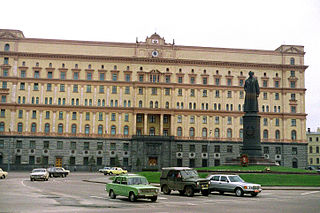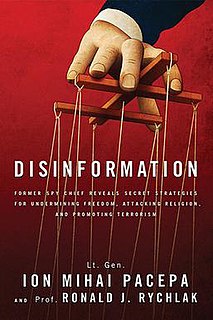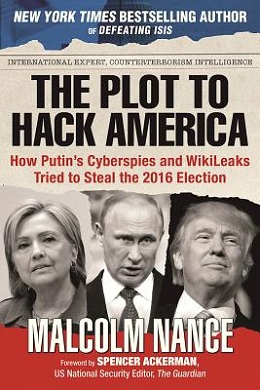Disinformation is a subset of propaganda and is defined as false information that is spread deliberately to deceive people. It is sometimes confused with misinformation, which is false information but is not deliberate.

Black propaganda is a form of propaganda intended to create the impression that it was created by those it is supposed to discredit. Black propaganda contrasts with gray propaganda, which does not identify its source, and white propaganda, which does not disguise its origins at all. It is typically used to vilify or embarrass the enemy through misrepresentation.
Plausible deniability is the ability of people, typically senior officials in a formal or informal chain of command, to deny knowledge of or responsibility for any damnable actions committed by members of their organizational hierarchy. They may do so because of a lack or absence of evidence that can confirm their participation, even if they were personally involved in or at least willfully ignorant of the actions. If illegal or otherwise-disreputable and unpopular activities become public, high-ranking officials may deny any awareness of such acts to insulate themselves and shift the blame onto the agents who carried out the acts, as they are confident that their doubters will be unable to prove otherwise. The lack of evidence to the contrary ostensibly makes the denial plausible (credible), but sometimes, it makes any accusations only unactionable.

Active measures is political warfare conducted by the Soviet or Russian government since the 1920s. It includes offensive programs such as disinformation, propaganda, deception, sabotage, destabilization, subversion, and espionage. The programs were based on foreign policy priorities of the Soviet Union.
Blowback is a term originating from within the Central Intelligence Agency, explaining the unintended consequence and unwanted side-effects of a covert operation. To the civilians suffering the blowback of covert operations, the effect typically manifests itself as "random" acts of political violence without a discernible, direct cause; because the public—in whose name the intelligence agency acted—are unaware of the effected secret attacks that provoked revenge (counter-attack) against them.

Operation Neptune was a 1964 disinformation operation by the Czechoslovak secret service, the State Security (StB), and the Soviet Union's KGB, involving fake Nazi-era documents found in submerged chests.
An agent of influence is an agent of some stature who uses his or her position to influence public opinion or decision making to produce results beneficial to the country whose intelligence service operates the agent. Agents of influence are often the most difficult agents to detect, as there is seldom material evidence that connects them with a foreign power, but they can be among the most effective means of influencing foreign opinion and actions as they hold considerable credibility among the target audience. Most commonly they serve the interests of a foreign power in one of three ways: either as a controlled agent directly recruited and controlled by a foreign power; as a "trusted contact" that consciously collaborates to advance foreign interests but is not directly recruited or controlled by a foreign power; or as a "useful idiot" that is completely unaware of how their actions further the interests of a foreign power.
U.S. Army Field Manual 30-31B is a document claiming to be a classified appendix to a U.S. Army Field Manual that describes top secret counterinsurgency tactics. In particular, it identifies a "strategy of tension" involving violent attacks which are then blamed on radical left-wing groups in order to convince allied governments of the need for counter-action. It has been called the Westmoreland Field Manual because it is signed with the alleged signature of General William Westmoreland. It was labelled as supplement B, although the publicly released version of FM30-31 only has one appendix, Supplement A.

Michael Paul Pillsbury is an author, and former public official in the United States. He has been the Director of the Center on Chinese Strategy at the Hudson Institute in Washington, D.C. since 2014. Before Hudson, he held various postings in the U.S. Department of Defense and U.S. Senate. He has been called a "China-hawk", and an "architect" of Trump's signature policy on China.
Russian espionage in the United States has occurred since at least the Cold War, and likely well before. According to the United States government, by 2007 it had reached Cold War levels.
Denial and deception (D&D) is a Western theoretical framework for conceiving and analyzing military intelligence techniques pertaining to secrecy and deception. Originating in the 1980s, it is roughly based on the more pragmatic Soviet practices of maskirovka but it has a more theoretical approach compared to the latter.

Political warfare is the use of political means to compel an opponent to do one's will, based on hostile intent. The term political describes the calculated interaction between a government and a target audience, including another state's government, military, and/or general population. Governments use a variety of techniques to coerce certain actions, thereby gaining relative advantage over an opponent. The techniques include propaganda and psychological operations ("PsyOps"), which service national and military objectives respectively. Propaganda has many aspects and a hostile and coercive political purpose. Psychological operations are for strategic and tactical military objectives and may be intended for hostile military and civilian populations.

Richard H. Shultz, Jr. is an American scholar of international security studies. He is a Professor International Politics at The Fletcher School of Law and Diplomacy, Tufts University, where he is also the director of the International Security Studies Program (ISSP).

Disinformation: Former Spy Chief Reveals Secret Strategies for Undermining Freedom, Attacking Religion, and Promoting Terrorism is a 2015 non-fiction book about disinformation tactics and history rooted in information warfare. It was written by former general in the Securitate, the secret police of Socialist Republic of Romania, Ion Mihai Pacepa, and law professor Ronald J. Rychlak. It was published in 2013 along with a companion film, Disinformation: The Secret Strategy to Destroy the West.

The KGB and Soviet Disinformation: An Insider's View is 1983 a non-fiction book by Lawrence Martin-Bittman. The book is about the KGB's use of disinformation and information warfare during the Soviet Union period.

Dezinformatsia: Active Measures in Soviet Strategy is a non-fiction book about disinformation and information warfare used by the KGB during the Soviet Union period, as part of their active measures tactics. The book was co-authored by Richard H. Shultz, professor of international politics at Tufts University, and Roy Godson, professor emeritus of government at Georgetown University.

Clint Watts is a senior fellow at the Center for Cyber and Homeland Security at George Washington University and a Foreign Policy Research Institute fellow. He previously was an infantry officer in the United States Army, and was the Executive Officer of the Combating Terrorism Center at United States Military Academy at West Point (CTC). He became a Special Agent for the Federal Bureau of Investigation where he served on the Joint Terrorism Task Force (JTTF). He has consulted for the FBI Counterterrorism Division (CTD) and FBI National Security Branch (NSB).

The Plot to Hack America: How Putin's Cyberspies and WikiLeaks Tried to Steal the 2016 Election is a non-fiction book by Malcolm Nance about what the author describes as Russian interference in the 2016 United States elections. It was published in paperback, audiobook, and e-book formats in 2016 by Skyhorse Publishing. A second edition was also published the same year, and a third edition in 2017. Nance researched Russian intelligence, working as a Russian interpreter and studying KGB history.

This is a timeline of major events in the first half of 2017 related to the investigations into links between associates of Donald Trump and Russian officials that are suspected of being inappropriate, relating to Russian interference in the 2016 United States elections. Following the timeline of Russian interference in the 2016 United States elections before and after July 2016 up until election day November 8 and the post-election transition, this article begins with Donald Trump and Mike Pence being sworn into office on January 20, 2017, and is followed by the second half of 2017. The investigations continued in the first and second halves of 2018, the first and second halves of 2019, 2020, and 2021.












